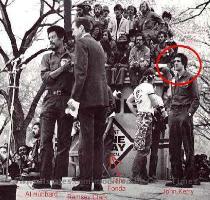Leaked Afghan war documents could damage US interests, endanger lives of cooperative locals
By Kimberly Dozier, APTuesday, July 27, 2010
US braces for blowback over Afghan war disclosures
WASHINGTON — Intelligence officials, past and present, are raising concerns that the WikiLeaks.org revelations could endanger U.S. counterterror networks in the Afghan region and damage information sharing with U.S. allies.
People in Afghanistan or Pakistan who have worked with American intelligence agents or the military against the Taliban or al-Qaida may be at risk following the disclosure of thousands of once-secret U.S. military documents, former and current officials said.
Meanwhile, U.S. allies are asking whether they can trust America to keep secrets. And the Obama administration is scrambling to repair any political damage to the war effort back home.
The material could reinforce the view put forth by the war’s opponents in Congress that one of the nation’s longest conflicts is hopelessly stalemated. Congress has so far backed the war, and an early test of that continued support will come Tuesday when the Senate Foreign Relations Committee, led by Sen. John Kerry, D-Mass., holds a hearing on the Afghan war.
Meanwhile, Pentagon spokesman Geoff Morrell said Tuesday the military doesn’t know who was behind the leaks, although it has launched “a very robust investigation.”
Morrell complained that too much was being made of the documents, of which even the most recent is at least six months old.
Speaking about questions the material raises about the reliability of Pakistan in the war on terror, he said statements about a dubious partnership are “clearly out of step with where this relationship is now, and has been heading for some time.”
Sen. Kit Bond, R-Mo., the ranking Republican on the Senate Intelligence Committee, said Tuesday he worries that the leaks won’t stop “until we see someone in an orange jump suit.”
Still, the leaks are not expected to affect passage of a $60 billion war funding bill. Despite strong opposition among liberals who see Afghanistan as an unwinnable quagmire, House Democrats must either approve the bill before leaving at the end of this week for a six-week vacation, or commit political suicide by leaving troops in the lurch in war zones overseas.
As that political battle plays out, U.S. analysts are in a speed-reading battle against their adversaries.
They are trying to limit the damage to the military’s human intelligence network that has been built up over a decade inside Afghanistan and Pakistan. Such figures range from Afghan village elders who have worked behind the scenes with U.S. troops to militants who have become double-agents.
Col. Dave Lapan, a Defense Department spokesman, said the military may need weeks to review all the records to determine “the potential damage to the lives of our service members and coalition partners.”
WikiLeaks insists it has behaved responsibly, even withholding some 15,000 records that are believed to include names of specific Afghans or Pakistanis who helped U.S. troops on the ground.
“It was dumped on us,” Morrell said of the document release. “It would have been nice if this organization had come to us and seen if there was anything in there that could endanger our forces.”
Former CIA director Michael Hayden denounced the leak Monday as incredibly damaging to the U.S. — and a gift to its enemies.
“If I had gotten this trove on the Taliban or al-Qaida, I would have called it priceless,” he said. “I would love to know what al-Qaida or the Taliban was thinking about a specific subject in 2007, for instance, because I could say they got that right and they got that wrong.”
Hayden predicted the Taliban would take anything that described a U.S. strike and the intelligence behind it “and figure out who was in the room when that particular operation, say in 2008, was planned, and in whose home.” Then the militants would probably punish the traitor who’d worked with the Americans, he said.
“It’s possible that someone could get killed in the next few days,” said former senior intelligence officer Robert Riegle. He recalled what happened when the U.S. arrested the Soviet double agent, Robert Hanssen: “When people found out what we knew, people died.”
Another casualty may be the U.S. attempts to forge cooperation with Pakistan’s secretive intelligence agency, the Inter-Services Intelligence.
Multiple American cables complain about ISI complicity with the Taliban. And they also tell the Pakistanis “how much we know about them,” said Riegle, who now runs Mission Concepts Inc., a private intelligence firm.
“You’re not going to see any cooperation,” he said. “People are going to freeze.”
The raw data released Sunday may also prove useful in a wider way to America’s “frenemies” — the intelligence services of countries like China and Russia, who have the resources to process and make sense of such vast vaults of data, said Ellen McCarthy, former intelligence officer and president of the Intelligence and National Security Alliance.
Hayden said: “If I’m head of the Russian intelligence, I’m getting my best English speakers and saying: ‘Read every document, and I want you to tell me, how good are these guys? What are their approaches, their strengths, their weaknesses and their blind spots?’”
Former CIA official Paul Pillar described what he called the coming chill in the U.S. intelligence community, which had been pushed into sharing information across agencies in the aftermath of the intelligence failures that led to 9/11.
“The pendulum will now swing back,” he said. Pillar, who now teaches at Georgetown University, said the community would shift from “need to know” back to “need to protect.”
Morrell was interviewed on CBS’s “The Early Show” and Bond appeared on NBC’s “Today” show.
Tags: Afghanistan, Asia, Central Asia, John Kerry, Military Intelligence, North America, Pakistan, South Asia, United States, Washington, Wikileaks



